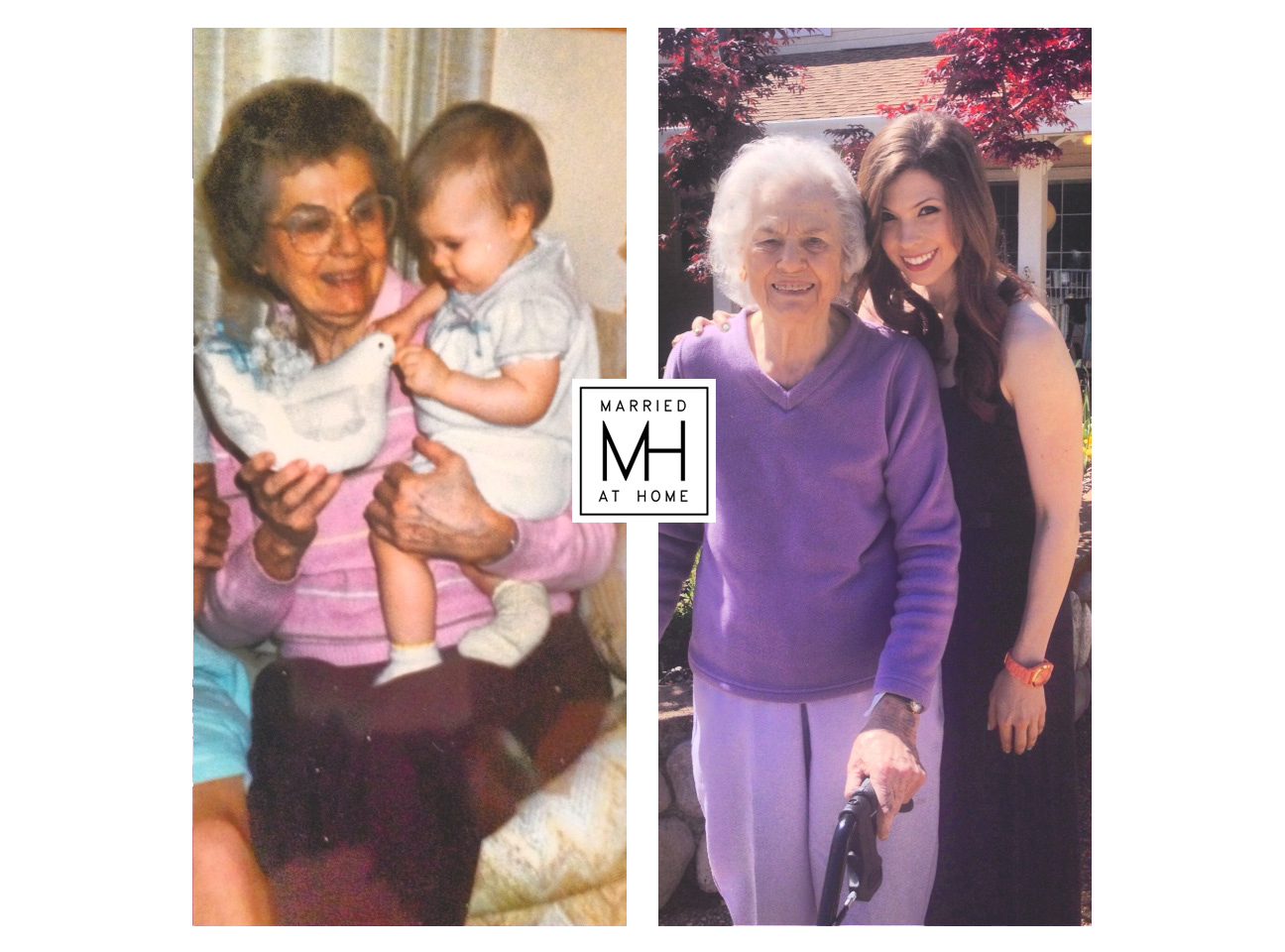Quiet days at the Farmhouse
I started writing Married At Home because I wanted a creative outlet, something that tied up in a bow the difficult year I had been through and made sense of a chaotic wedding experience that I hadn't quite processed yet. My hope was to write several times a week, and I found inspiration everywhere - at our Farmhouse, from our wedding, and in the life Johnny and I were building together.
And then, my Grandma died. And the energy I had gained from writing and creating gave way to deep, dark grief.
It was a shock when her death left me as broken as I was. I had naively expected to be steeled up for it; she was 99 after all, but gave every indication of living to 100 and far, far beyond. She wasn't sick, didn't have unhealthy habits and wasn't even really disabled. Her heart just got tired, and slowly, over the course of a couple weeks, life faded away from her.
There was mercifully enough warning for me to get on a plane. Using a lifetime worth of United miles for what was probably the best thing I ever could have redeemed them for, I rerouted the return leg of a business trip and landed in my small hometown on what turned out to be the last weekend of her life. I don't think she knew she was close to the end; I did.
We had six visits over the three days I was there. And she was hilarious! Full of love for me, jokes and lots of memories - of when I was a little girl stubbornly refusing my oatmeal; of when she was a little girl picking cotton on the family farm, in fierce competition to pick more than her brothers... what we said and did five minutes in the past was gone, but her memories of nine decades earlier were vivid and nuanced. She described the workman gloves her mother made the children from denim; the way her mother had picked the baby chicks up in her apron to save them from the rain. We talked a lot about her days on the farm.
Each visit was markedly different. Some she was very clear, others confused. During one she joyfully sang "Que Sera Sera" with my mom and poked my dad with her cane for cracking jokes and being such a wise guy. On another, I realized the deep chasm between her memory and understanding of Mari-the-child and Mari-the-grownup. She knew and loved us both, she just couldn't comprehend that we were one person in the same. Heartbreaking.
My Grandma knew and loved Mari-the-grownup because Mari-the-grownup was the sad, work-burdened, stressed out sap who wrote her every single day on the blessed invention that was her Presto machine with a summary of the day's events. For probably the last five years, I wrote her daily of my indisputably first-world problems: work is challenging; I got sick; I had a bad day; I feel tired, tired, tired. I had to remind myself at times to keep it upbeat, but regardless of that effort I'm sure she could have easily thought of me as petty and whiny. As she lost her ability to write, one of the last letters she hand-wrote me in her beautiful penmanship was to comfort me over one of the very silly and surface-level problems I was having at work. Looking back, that makes me feel ashamed.
This graciousness came from a woman who scratched and fought to get an almost unheard-of high school education in the Depression-ravaged 1930s. She worked herself through school cooking and cleaning for a family to pay her way, and to the end of her life, spoke in awe of the kindness of relatives and friends who bought her her cap and gown, yearbook, and class ring for graduation - she never would have been able to afford them on her own. She worked hard for decades upon decades as a seamstress, buried her husband and two of her three children, and lost her ability to sew and later to read, her two passions, after a series of strokes.
As I sat with her hand-in-hand on one of our last visits, she asked me what was going on in my life, so I told her again about the subjects I had written to her of many times in my letters. Work is tough. I got married. We bought a Farmhouse. I am trying to go back to school. I am trying to make all the right decisions and do a good job with my life. But life is so hard. Sometimes things are up and sometimes things are just down. And to that last point, she looked at me, and with a lot of clarity, she said "That is so true." She would certainly know.
"There is only one thing I can do for you;" said my Grandma, as we sat. She paused long enough for me to foolishly wonder what she was going to say next, maybe make a joke about leaving me something in her will - she was, after all, hilarious up to the end. But she offered something far more meaningful and I instantly felt embarrassed for not knowing what she was going to say. "There is only one thing I can do for you, and that's to pray for you." Her words rang and rang in my ears.
On the last of the six final visits I had with my Grandma, she was very medicated and slept almost the entire time. I both rejected and understood that those would be our last minutes together. I looked intently for a moment at her arms, her hands - large, weathered, but never frail - thinking about the phenomenon of missing someone's physical attributes as well as their spirit. Her skin, her nails, even her veins, so familiar to me - had all known a century on earth and yet would soon disintegrate away, be turned into something else entirely and be buried. My heart started beating faster and a lump rose up in my throat.
What do you say in your last words to someone? I certainly didn't know. "I love you Grandma," I said. "Thank you for praying for me." Tears. Fighting, gritting, praying away, desperately banishing the tears. "I love you too," she whispered back from near-sleep. "Goodbye," I said. "Goodbye," she whispered. And that was it. We literally just said goodbye to each other, as if we were parting at the end of a holiday spent together. But instead, it was our permanent separation on earth. So final. So strange.
Grief is odd in the ways it creeps up on you. For many days after her death, I had haunting urges to write my Grandma, instincts that bypassed the obvious logic and came from a place of deeply-ingrained habit, part of my nightly routine. I would ignore them; they would get louder. I would ignore them again - they would pop up, screaming, screeching, demanding to be heard. Write your Grandma. Write your Grandma. Start the email. It's getting late. Think of interesting topics to tell her. Tell her about that funny thing that happened today. Start the email. Dear Grandma. Write your Grandma. Some nights, the urge was incessant. Sometimes I had to take an anxiety pill just to sleep.
I still think about my Grandma every day, still search my thoughts for an interesting or notable event to share that would shake up the monotony of the banal stream-of-consciousness I once shared with her, still feel disappointed when I have a particularly good tidbit or photo that I can't use for her anymore; what a waste. What a loss. And in this void, my creativity and desire to write and to make and to find beauty has quieted, too.
So as I find my way now in a new life without Grandma, I am trying to fill my days differently. Just like a counselor once introduced to me the very foreign concept of, "why don't you wear clothes that feel good, not just look good?" I am trying to spend my precious time on earth doing what is comforting, what feels good. Right now, that means more relationship time, less computer time. More living a perfect moment, less staging a perfect photo. More things that would be worth writing my Grandma about. Less that would make her worry.
Just as I spent years in dialogue with my Grandma about myself, she spent years in dialogue with God about me, praying for me. And maybe she still talks to God about me. And no matter what, I want to make sure I am living a life worthy of that kind of correspondence.







